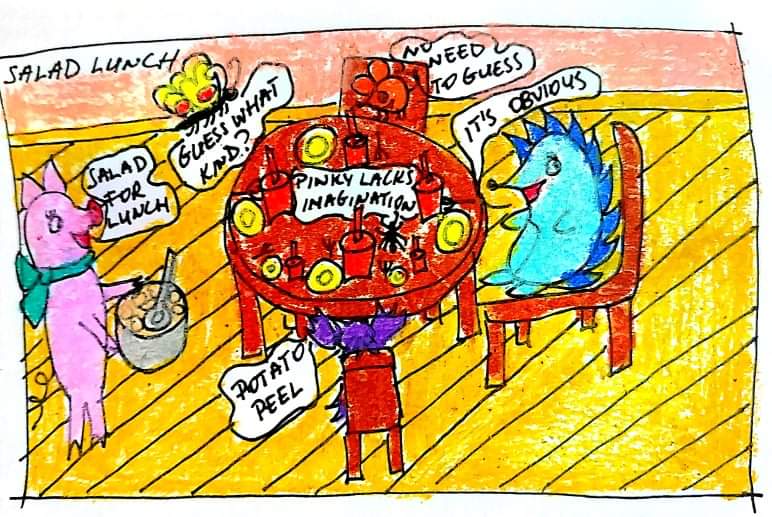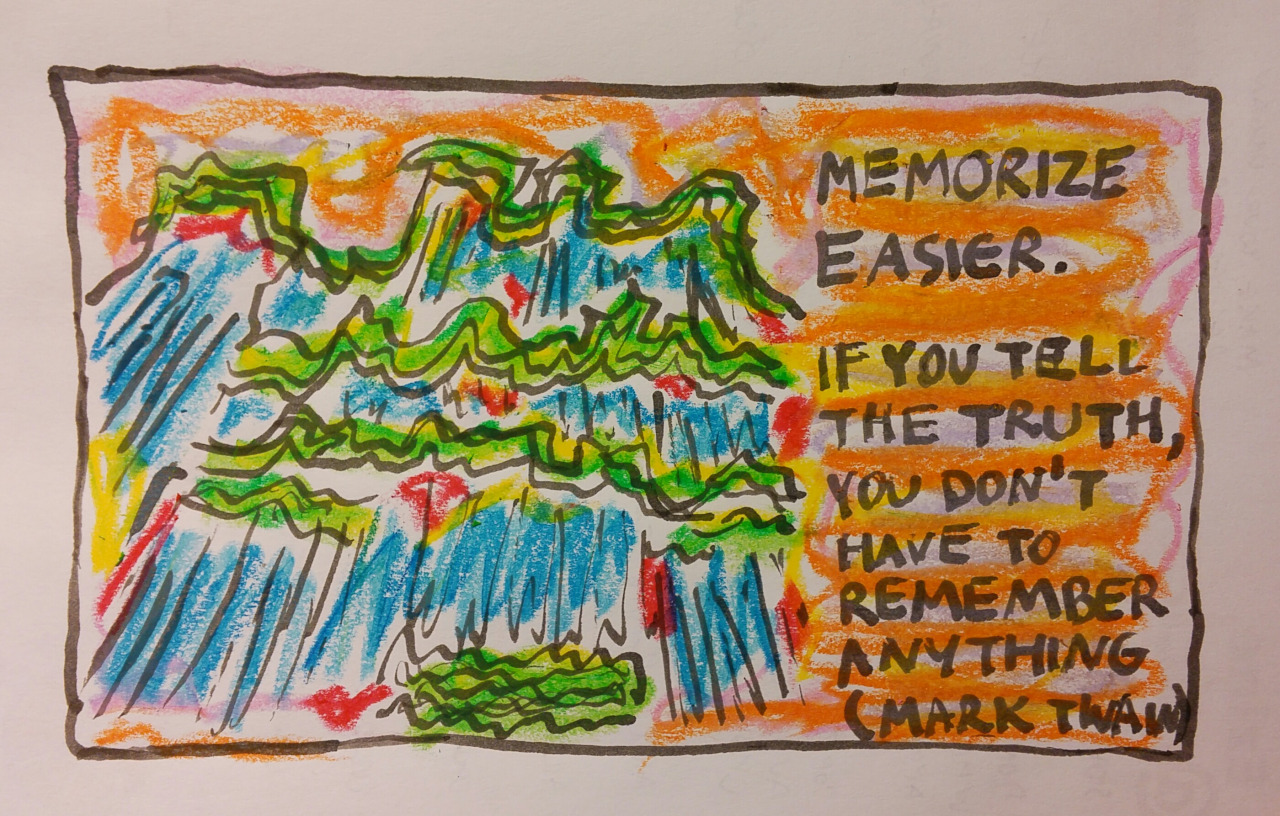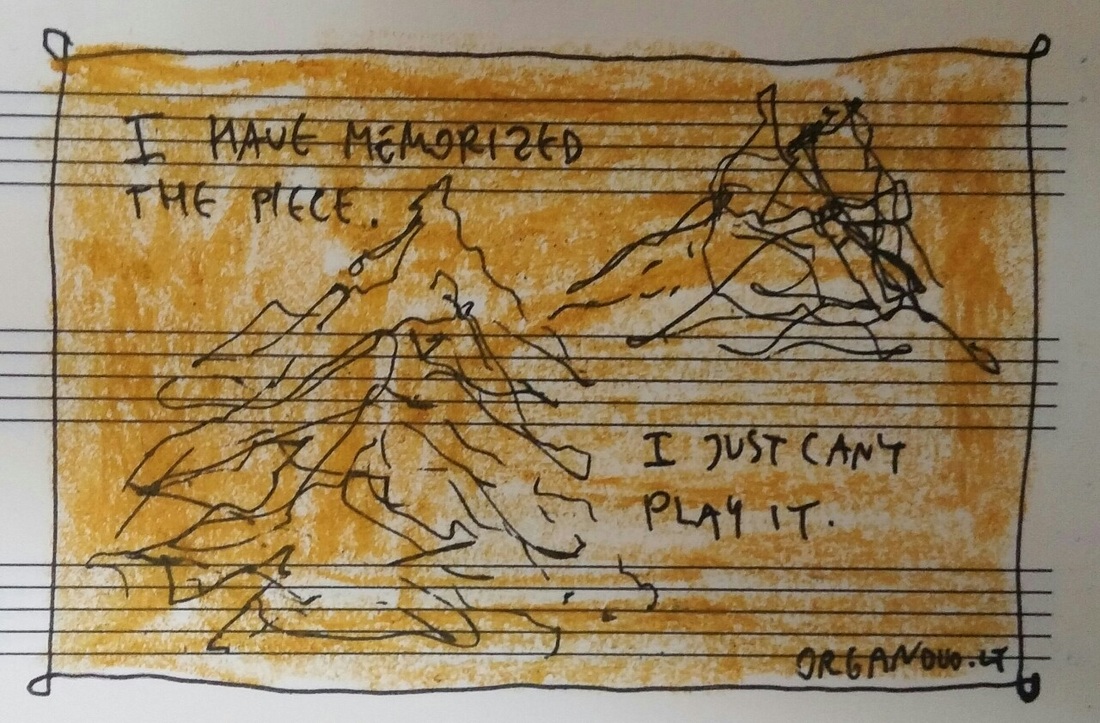|
Vidas: Hi guys, this is Vidas.
Ausra: And Ausra. V: Let’s start episode 353, of Secrets of Organ Playing Podcast. This question was sent by Jonathan. He writes: Memorizing a 3-voice piece. I’m not sure how best to do this. I’ve been memorizing a phrase at a time, then gradually stringing them together. Any suggestions? V: This is seems like a good idea, right? A: Yes. That’s how I thought, when I was studying at school. That you need memorize two measures, then add next two measures, then two measures. It is actually… V: Mmm-hmm. A: But, really memorization is probably the hardest thing for me. And I have struggled with it for many, many years. But now when I’m thinking back, I think that I was just too lazy and didn’t start to memorize things on time. Sort of why I always fell behind the schedule and, right before exam or concert, I would be just faking out. V: Wait! You said you were too lazy. I thought I was the lazy one. A: Well, yes. Back at school I was lazy too. V: Wow! A: Not about everything but about memorization, yes. Somehow I always procrastinated this thing—starting to memorize pieces. V: Maybe that’s because nobody told you the technique, how to do it. A: No, I just was too lazy. Because if you would spend enough time with it, you wouldn’t have such a struggle. Of course there are different techniques, but you have also to know your structure of the piece, how it’s put together, and all these things but definitely there is no technique which will teach you to memorize things without putting effort into it. V: Yet! Maybe later you will have photographic memory, and then you can memorize right away. A: Well, I think what kind of memory you have since your birth, that’s what you have. And if you don’t have such a memory, photographic memory, you will not develop it. It’s not as easy. V: Remember how electronic organs sometimes have MIDI capabilities, and sometimes you can play a piece of music and record at the same time. And then push the button and the organ will play, playback for you. You can actually listen from the pews. A: So, what about… V: Maybe in the future we will have some kind of memory card inserted in our brains. A: I hope that not. V: And then we don’t need to memorize. Everything will be in the cloud. A: But right now, if you still have to memorize something, I would suggest for you to analyze the piece that you are working on and you have to memorize it. So this is the thing that I didn’t do when I was a child, and I think that’s a big mistake but nobody taught me to do it. So you need to know what form is your piece written in. You need to know the tonal structure of it. And then of course you need to do that memorization thing, and I would do it in phases—learn two measures, then add another two measures, and then another two measures and repeat everything from the beginning. And I think when you actually perform it, you will have no trouble. And when playing you really need to know in which exact spot you are, at the right moment. Because sometimes when we are playing from memory, we just let things happen. V: Mmm-hmm. A: And it works sometimes, and it works well sometimes but not always. Because suddenly if you will think about something, you might slip and you might lose the general flow and then you will not have idea where you are and what are you playing. Have you had such experience before, Vidas? V: Many times. A: So… V: That’s why I started improvising. So that I could play something even though I would forget what’s written on the page. A: Yes. And I think playing from memory, I still have this nightmare, time after time, that I’m back in the school and I have to play exam and I just don’t remember a thing. V: My nightmare is that I have to play an exam and I don’t even know the music. A: Well, I have that with organ recitals, this nightmare, that I’m sitting at the organ bench and I hear that bell towers already ringing… V: Uh-huh. A: And it means that I have to start my recital to play, and I look at the music rack and I don’t recognize these pieces at all. Or I recognize them and these are like massive organ compositions that I have played either many years ago or haven’t played at all. V: Reger. A: Yes, Reger, and all these big long compositions. V: My recent nightmare was that I had missed a piano exam of my student and now I myself have to play that exam. A: Instead of him? V: Instead of him. A: That’s a funny dream. But I guess it wasn’t funny when you dreamed about it. V: No. Just yesterday, last night, I had a dream that I went to the school and sort of, it was a meeting of piano teachers, and I, in the middle of that dream, I understood that I’m no longer a teacher there. A: Excellent. V: And I told everyone. A: Excellent. But in general, do you think when talking about organ music and memorization of organ music—do you think it’s a helpful and it’s a good practice to memorize things and to play, to perform from memory or not? What is your opinion? V: It depends on your goals. If you want to play just a few pieces perfectly, then yes. But if you want to play a lot of pieces, then it really slows down the process. It actually doesn’t help with your sight-reading skills, and you lose that ability to read many musical compositions fluently, if you just memorize things. It’s really good for blind people for example, and I would add actually to Ausra’s ideas about memorization, that Jonathan could try out Dupré’s method, how to memorize. It’s not in two measure phrases but in sentence long excerpts. A: So that’s four measures. V: Four measures, but not entirely in four measures. But first you repeat ten times, five times looking at the score and five times without looking at the score—one measure, just one measure. And then the same thing—the second measure, then the third measure and the fourth measure—basically each measure separately. Then the second stage is to do two measure excerpts—one and two, two and three, three and four. Then memorize three measures—one, two three, two, three four. And then finally one, two, three, four—entire sentence together, playing five times from the score, five times from memory. And always starting and finishing on the downbeat of the measure. And that helps to connect different fragments. And after you do that, you can take a break, or continue with the next fragment of four measures. And the next day maybe you start your practice with repeating previously mastered material a few times, and then learning something new again, four measures at a time. It’s very systematic. I’ve done this before, and it then helps me retain this music in my memory for a long time. A: For how long? V: For a month. And then after a month I have to repeat the process a little bit to refresh. A: Well, so it seems that it is much harder to keep your repertoire alive in that way if you memorize everything. Just think how much things you will have to repeat. V: Mmm-hmm. I guess this is for people who either have extremely good memory, you know, phenomenal memory, or who don’t play a lot of music. Maybe they have two, three hours total of repertoire and that’s it. And they do in cycles—refresh the memory and once they have three hours they’re set and tour the world. That could be done, but it’s not my goal, I mean it’s not interesting to me just to have that kind of music and not to learn anything else. But because it definitely requires… A: A lot of time. V: Lot of time and refreshing of memory of old memorized pieces. But I would advise anyone to try it as an exercise. You have to learn a few pieces this way. It’s very helpful, I think. A: Yes, definitely it is. V: In order to know what works for you and what not. A: That’s right. V: Alright! We hope this was helpful, right Ausra? A: Yes. V: And please keep sending us your questions. We love helping you grow. And remember, when you practice... A: Miracles happen!
Comments
Vidas: Let’s start Episode 96 of #AskVidasAndAusra podcast. And today’s question was sent by Rivadavia, and she writes that she struggles with lack of memory. Ausra, is it a common problem for people, do you think?
Ausra: Yes, I think so. Vidas: Did you have any students, when teaching, who complain that they can’t really memorize things and pieces? Ausra: Well, not so much; but performance anxiety--I get more of that. Being afraid that during a performance they will forget the music, and they will stop. What about you? Vidas: Myself, I struggled a lot with memorization, and that was actually probably one of the frustrations I had with my piano playing, back in school. Because normally, we had to play recitals and concerts and exams from memory, several pieces. Ausra: Sure. Vidas: And I just wasn’t good with that. I could sight-read rather well; but when my teacher told me to memorize a piece of music in a week or so, I just didn’t know how to do this. Ausra: Yes. And I remember that I always started to memorize pieces too late, and then I would be worrying so much when an actual performance would come. And I still have nightmares at nighttime, that I’m playing a recital or exams, and suddenly I forgot my music! Vidas: You’re not alone in this. I think just a couple of days ago, I had this lesson with my piano student at school, and for I think four weeks in a row, I’ve been nagging him to memorize his piano pieces. And one of the pieces is 3-part Sinfonia in d minor by Johann Sebastian Bach. And he just can’t seem to force himself to do this. The easier pieces that he’s playing, yes, he’s getting ready, and can at least play episodes from memory; but the tricky polyphonic texture, I think he delays it, postpones it; it’s a procrastination thing for him. Ausra: Well, that’s just too bad. Vidas: But kids, small kids, they don’t have problems with memory. I have a second grader who cannot read music, but can play everything from memory just fine. Ausra: Haha! Vidas: So that’s the opposite! Ausra: Yes, that way it’s easier for him just to memorize pieces for him--so that he won’t have to look at the music score! Vidas: He looks at his fingers, at the keyboard, and he memorizes the positions at the keyboard. Of course, he doesn’t understand anything about what he is playing! That’s another problem. Ausra: Hahaha. That’s true; but that’s what kids and beginners do. Vidas: Yeah. So guys, if you struggle with this, know that you’re not alone. I haven’t met a person who in some way, shape or form, doesn’t struggle with memorization. And I think the problem might have something to do with a theoretical understanding of what’s happening in the score. Ausra: And I guess some people are just more gifted than others, because the types of memory that human beings have are so different. For example, you could have very good visual memory. And I envy those people. Because I have heard such stories: for example, one pianist, he would perform a recital, and he would turn imaginary pages for himself, because he could just see the score in front of him. So that’s just unbelievable. Vidas: Or Marcel Dupré, who’s famous for having played I think 10 recitals in a row from memory, at the Paris Conservatory--the cycle of the entire organ works of Bach. And each recital was paced every 2 weeks. So basically, he had to know a gigantic amount of repertoire under his fingers from memory. Usually pianists and organists can play from memory maybe an hour’s worth of repertoire; maybe 2 hours, right (if it’s a long recital). Maybe if they are touring, maybe 3 hours at the most, if they have 2 recitals of 90min each, you see. That’s the most they can do. But Marcel Dupré managed to play everything from memory, 10 recitals in a row. That’s kind of unbelievable. Ausra: It is unbelievable. Vidas: And he did that I think 3 times, one in Paris and then I think twice in America. But he didn’t enjoy that--I’ve read that he didn’t want to repeat it that many times. Ausra: Yes, I think that’s just too much. Vidas: It’s torture! Ausra: Yes, even for him, that’s too much. Vidas: But it’s like a marathon, right? A very long race. Do you know who enjoys marathons? Professor James Kibbie. I’ve had a wonderful podcast conversation with him about his Bach project: he also recorded the complete works of Bach, and I think also from memory. But not in a marathon session like Dupré; but over a period of time, maybe over a period of one year, when it was Bach’s anniversary. He went to Germany, to the famous historical organs, and recorded. So he writes that he likes to run marathons, right? Ausra: Mhm. Vidas: And this strenuous, continuous running practice helps him to focus for long-term commitment to long cycles, such as recording all the music of Bach over one year, you see. Ausra: That’s amazing. Vidas: It is amazing. So guys, if you’re struggling, remember that everybody else is also struggling; but some people find something that works for them, running a marathon, or something else. So keep looking for that golden bullet, and keep looking for things that work for you specifically. Right? But I think you have to understand--we have to explain to people, Ausra--do you think that they should mimic their masters and try to copy them? To be like Marcel Dupré or James Kibbie? Ausra: I don’t think so. I think everybody has to find their own way, because we are all so different. Vidas: Yes. So guys, please be yourself; that’s the only thing that matters. And remember, when you practice… Ausra: Miracles happen. By Vidas Pinkevicius (get free updates of new posts here)
Are you suffering when trying to memorize music at the organ? Do you practice for hours only to find out you can play just 2 measures of your organ piece? If so, let me help you. I have created a video course "Memorize Easier" in which with the help of J.S. Bach's chorale prelude from Orgelbuchlein "Wir danken dir, Herr Jesu Christ", BWV 623 I demonstrate all the steps required for an easy, fast, and efficient memorization. I personally use the same system when I want to memorize organ music. After you complete this training (you can use your own piece, not necessarily BWV 623), you will not need to struggle with memorization ever again because you can apply these steps to any piece you want. You can check out "Memorize Easier" here (50 % discount is valid until January 18). By Ausra Motuzaite-Pinkeviciene Last summer was 20 years since I've graduated from the National M.K. Ciurlionis School of Arts in Vilnius, Lithuania. This school year was the 10th year of my teaching at the same school. So, as you can imagine I know this school well enough and feel most comfortable in it. Nevertheless there is one room that makes me feel miserable - that's the little concert hall, where all my piano exams took place.
You may ask why is it? Because in that concert hall I had to play all music by heart. Sometimes I still have nightmares in my dreams that I'm performing and suddenly I forget what's coming up next... I'm sure, many musicians share the same or similar memories and have many stories to tell. Now after many years of variuos musical practices I realized that the main problem of me having this horrible feeling about lost memory was that I wasn't well prepared. Of course, at that time I couldn't be honest with myself as I can be now. I always started to memorize my music too late, so I never had enough time to live with it and to feel comfortable during the actual performance. Of course I was raised as a professional, so I would still play it pretty much well, but that would cost a lot of my nerve cells. So if you have to perform from your memory, start to memorize well ahead of time. Be honest with yourself and hopefully you will avoid my nightmares. You can fool your listeners but you can't fool yourself. It is a great challenge to play from memory in public. Often we might panic, lose focus and simply forget even half of the piece. In cases like these, it happens that a person starts the piece from the beginning and gets stuck in the same place or stops and doesn't know what to do.
This situation is very awkward for both the performer and the listener. Afterwards the performer might swear to never again perform from memory in public or even tries to avoid public performance altogether. In order to finish the piece as fluently as possible, you need to stay calm and perform a special trick which will surely save you. |
DON'T MISS A THING! FREE UPDATES BY EMAIL.Thank you!You have successfully joined our subscriber list.  Photo by Edgaras Kurauskas Photo by Edgaras Kurauskas
Authors
Drs. Vidas Pinkevicius and Ausra Motuzaite-Pinkeviciene Organists of Vilnius University , creators of Secrets of Organ Playing. Our Hauptwerk Setup:
Categories
All
Archives
July 2024
|
This site participates in the Amazon, Thomann and other affiliate programs, the proceeds of which keep it free for anyone to read.
Copyright © 2011-2024 by Vidas Pinkevicius and Ausra Motuzaite-Pinkeviciene.
Terms of Service and Privacy Policy
Copyright © 2011-2024 by Vidas Pinkevicius and Ausra Motuzaite-Pinkeviciene.
Terms of Service and Privacy Policy








 RSS Feed
RSS Feed